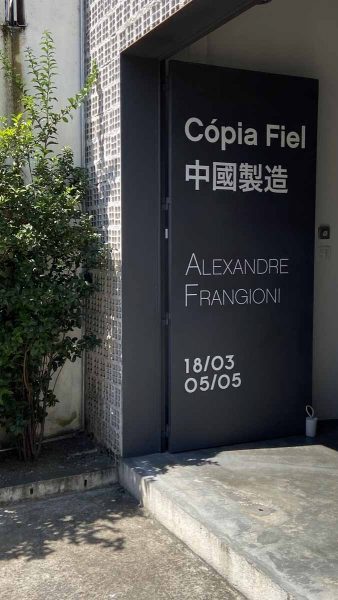Cópia Fiel (Faithful Copy)
Babel Art Gallery
March, 2023
China – an ancient civilization with over 4,000 years of history and the largest population on Earth – has always been a very distant country from Brazil. This fact has changed radically with the impact of globalization caused by the world economy, a scam for the poorest countries. For China, it was, without a doubt, a “business from China” [real bargain][1]. China is responsible for the production of countless products consumed by us in the West. On the other hand, we in Brazil export a huge amount of agricultural products to feed the population of over 1.4 billion Chinese. We are all hostages of this situation, West and East.
Since 2018, Alexandre Frangioni has been deeply involved with the research that proposes a reflection on the implications of globalization in today’s society. After all, what has globalization brought that is positive to the world? The pasteurization of the different and rich cultures of various regions of the world? The excessive consumption of products that, most of the time, we don’t need? Or the growth in social inequality?
The series “Made in China” was produced in recent years as a humorous critique of today’s society that is shaped by consumption, which questions the preservation of nature, the different cultures and the beings that inhabit our planet. The repetition of the phrase ‘Made in China’, produced with obsession by Frangioni, is the same one that we find in thousands of products we consume, many of them “original copies” of clothing and accessory brands that are inaccessible to the majority of the world’s population, usually produced on a large scale by people who live in extreme poverty in China and India.
“Frangioni’s attitude to knotty ideas that can be difficult to conceptualize can be effectively summarized in a phrase: he casts complex ideas in efficaciously simple visual nutshells,” writes critic Christian Viveros-Fauné in the book One Art History, published in 2021 about several artist’s works. In other words, he takes every day’s marketing slogans, even if they are implicit in the most diverse ways, and gives them another context.
For centuries, humans have used the repetition of symbols, codes and icons as a way of imposing cultures, religions or habits. In the religious art of the Middle Ages and the Renaissance, the repetition of events that occurred in the Christian religion was used to promote the Church, given that the crucifix is one of the symbols that has been most frequently repeated in history and in our daily lives for over 2,000 years. There is no brand, object or logo that has surpassed the use of this symbol to this day. Contemporary art, since the French artist Marcel Duchamp (1887-1968), has precisely aimed at bringing another context or place to these symbols, icons and objects. This fact is notable in the works presented in this exhibition, as well as the antagonistic relationships between contemporary issues such as quality and cost, sustainability and productivity, poverty and wealth, authenticity and copying.
Frangioni’s work is in tune with Duchamp’s artistic concepts, but it also touches on the economic, political and social reflections addressed by the work of Cildo Meireles (Rio de Janeiro, 1948), for example, or the sharp humor of Nelson Leirner (São Paulo, 1932 – Rio de Janeiro, 2020), which are fundamental to understanding the contemporary history of Brazilian art. It also meets the curatorial proposals of the XV Documenta in Kassel (2022), whose curators from the Ruangrupa collective from Jakarta proposed artistic actions based on the experience of the Lumbung (rice barn), where communities share their food equally. Art should also “feed” us equally, through actions in which everyone participates and ceases to have a monetary value and begins to have a social value. In this way, it questions the entire economic system adopted in the world that makes the rich increasingly richer and the poor increasingly poorer.
Frangioni’s works are similar to those presented by the members of Ruangrupa, as they criticize the economic and social system in which we live. However, Frangioni does it in the opposite way, since each of his works is done by hand, leaving the “artist’s mark”. From the wooden crates that are meticulously redesigned, copied and remade to the phrase “Made in China”, written in the style of Coca-Cola and printed on labels that are “faithful copies” of those glued to the bottles of the soft drinks, the works are produced by hand, whether through collage, painting, drawing, embroidery or even printing, all ancient art techniques. In this sense, his work distances itself from the “ready made object”, so present in contemporary art worldwide.
In this way, this curious artist, who has a degree in Chemical Engineering, deceives our eyes. After all, are these works copies or originals? Or are they original copies?
Rejane Cintrão
March, 2023
[1] Free translation from the typical Brazilian expression “negócio da China”, which literally means “China’s business”.







